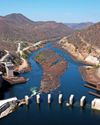
A surge in new oil and gas exploration in 2024 threatens to unleash nearly 12bn tonnes of planetheating emissions, with the world's wealthiest countries - such as the US and the UK - leading a stampede of fossil fuel expansion in spite of their climate commitments, new data shared exclusively with the Guardian reveals.
The new oil- and gas-field licences forecast to be awarded across the world this year are on track to generate the highest level of emissions since those issued in 2018, as heatwaves, wildfires, drought and floods cause death and destruction globally, according to analysis of industry data by the International Institute for Sustainable Development (IISD).
The 11.9bn tonnes of greenhouse gas emissions resulting over their lifetime from all current and upcoming oil and gas fields forecast to be licensed by the end of 2024 would be greater than the past four years combined - and roughly the same as China's annual carbon pollution. The projection includes licences awarded as of June 2024, as well as the oil and gas blocks open for bidding, under evaluation or planned.
Meanwhile, fossil fuel firms are ploughing more money into new sites than at any time since the 2015 Paris climate deal, when the world's governments agreed to take steps to cut emissions and curb global heating.
The world's wealthiest countries are economically best placed - and obliged under the Paris accords - to lead the transition away from fossil fuels. But these high-capacity countries with a low economic dependence on fossil fuels are spearheading the latest drilling frenzy, handing out 825 new licences in 2023, the largest number since records began.
This story is from the {{IssueName}} edition of {{MagazineName}}.
Start your 7-day Magzter GOLD free trial to access thousands of curated premium stories, and 9,000+ magazines and newspapers.
Already a subscriber ? Sign In
This story is from the {{IssueName}} edition of {{MagazineName}}.
Start your 7-day Magzter GOLD free trial to access thousands of curated premium stories, and 9,000+ magazines and newspapers.
Already a subscriber? Sign In

Friendship interrupted
They were best mates. Then one had a baby, while the other struggled to conceive. They share their brutally honest takes on what happens when motherhood affects friendship

KERNELS OF HOPE
During the siege of Leningrad, botanists in charge of an irreplaceable seed collection, the first of its kind, had to protect it from fire, rodents-and hunger

A new horizon' The inverse link between cancer and dementia
Scientists have long been aware of a curious connection between these common and feared diseases. At last, a clearer picture is emerging

Across the universe
Samantha Harvey won the Booker prize with a novel set in space. Yet, she says, Orbital is actually 'a celebration of Earth's beauty with a pang of loss'

Frank Auerbach 1931 -2024
Saved from the Holocaust, this artist captured the devastation of postwar Britain as ifits wounds were his own but he ultimately found salvation in painting

Seven lessons I've learned after 28 years as economics editor
Margaret Thatcher was Britain's prime minister and Neil Kinnock was leader of the Labour party.

Droughtstricken dam leaves economies powerless
A ll is not well with the waters of Lake Kariba, the world's human-made lake largest A punishing drought has drained the huge reservoir close to record lows, raising the prospect that the Kariba Dam, which powers the economies of Zambia and Zimbabwe, may have to shut down for the first time in its 65-year history.

Let this be the end of these excruciating celebrity endorsements
I wish celebrities would learn the art of the French exit. But they can't, which is why Eva Longoria has announced she no longer lives in America. \"I get to escape and go somewhere,\" she explained.

Alive, but unable to thrive under absolute patriarchy
Since the Taliban returned to power, women and girls have tried defiance, but despair at their harshly restricted lives

‘It's tragic’ Reflection in the wake of Amsterdam violence
Carrying signs scrawled with messages urging unity, they laid white roses at the statue of Anne Frank, steps away from the home where her family had hidden from Nazi persecution.